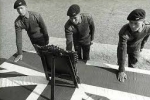Christmas is only three weeks away and on Saturday my partner and I are attending the Stony Stratford lights switch on (the Old Man can be heard practising his “Ten! Nine! Eight Seven!” etc countdown round the place…) and then attending a local production of The Messiah on Sunday. At the end of next week our office Christmas trees will go up (branded and tasteful!). I can hardly restrain my team who are mad keen to get the deccies up. We’re writing to our clients with information about Christmas arrangements and our contribution to two of our favourite charities (I will give them both a plug here because they’re well worth supporting so do pay a visit to their sites – www.willen-hospice.org.uk and www.dogsforthedisabled.org). Oh yes and we’ve booked our team Christmas lunch. So we’re pretty well sorted out.

As I’ve written elsewhere (many times),we live in a multi-cultural society. We have done so since pre-Roman times. We just talk about it more now. Despite the season’s many secular activities Christmas is a Christian festival and if we have Christmas celebrations we have to ensure that we include those from other cultures and faiths in an appropriate fashion.
Religious differences can be damaging if not well-managed; in fact differences of any type can be divisive even if they don’t originate from a protected characteristic. For example, reorganisations can break open all sorts of cultural problems. Mergers can bring about cultural clashes, and people who have worked in one particular department may have got used to a specific way of doing things that they finally have to leave behind when two departments merge.
Lieutenant General Sir Nick Parker recently spoke about this problem when he reorganised some of the British light infantry into a new regiment ‘The Rifles’. Commonly known as the ‘Sharpes’ of the Army (due to their partial heritage with the Green Jacket skirmishers immortalised by Sean Bean),The Rifles were only fairly recently formed out of various other regiments and battalions. The British Army can face cultural problems when it reorganises, as the regimental system creates fierce loyalties from its soldiers. For years, soldiers were told that being part of the 2nd Battalion of whichever regiment was a matter of pride and that it made them distinctly different from the rest; then they would suddenly have to accept that being part of the 2nd Battalion The Rifles is somehow as good or better than their last posting. How do you break such a strong habit?
The Lieutenant General’ approach was to create a strong culture for The Rifles that no-one could disagree with or not be proud to be a part of. This required basic ‘Rifles values’, a distinctive ‘Rifles style’ and a ‘Rifles ethos’ such as a ‘lightness of touch’ and a ‘subtle yet sure system of control designed to release potential’. Whilst plenty of regiments might aspire to these values, the fact was The Rifles were vocally claiming to espouse them. Ultimately The Rifles had to fight the enemy, not each other.
Words alone though were not enough, and this culture could only be cemented through action: The Rifles achieving success on the battlefield and proving that the fundamental values and culture of the regiment are well-founded.
Whilst this degree of fierce loyalty may not normally occur in companies, the lesson is still relevant. Reorganisations of any kind put people on edge and introduce uncertainty. They may have got very used to working with specific people on the same kinds of projects. Two departments that once performed excellently by competing with one another may suddenly have to combine. To find themselves in a completely new set-up and knowing that some colleagues may have lost their jobs can be difficult enough to start with, let alone getting the new tasks right.
‘Survivor syndrome’ and a general dislike of change need to be overcome with a strong sense of purpose, support from the employer and introducing a sense of urgency to get work done. If they are good workers with a sound desire to get things done, then a clear, practical purpose can do a lot to build bridges. Departments need to compete with the external opposition, not each other.
Clear leadership is vital. The ability to instill the new culture and bring people along with you are critical for success. There are bound to be elements of the past worth preserving, but ultimately those taking the organization forward need to focus on the new reality.
Russell HR Consulting provides expert knowledge in HR solutions, employment law training and HR tools and resources to businesses across the UK.
Subscribe to our free monthly HR newsletter. Russell HR Consulting employment law newsletters are emailed automatically to our ever-growing number of subscribers every month.
Latest blog posts
- Is There a Santa Clause?
06 / 12 / 2023
- Lend Us a Hand!
22 / 11 / 2023
- What Happens When There is a Clash in Protected Characteristics?
17 / 10 / 2023
- Encouraging a Healthy Workforce 2
21 / 09 / 2023
- Encouraging a Healthy Workforce
23 / 08 / 2023
- What a Disaster - (But We Have a Cunning Plan!)
20 / 07 / 2023
- It’s Time We Stiffened the Sinews
14 / 06 / 2023
- Why Is It So Important to Develop Emotional Resilience?
16 / 05 / 2023
- When is a discretionary bonus not discretionary?
20 / 04 / 2023
- Recovering Training Costs 15 / 03 / 2023
